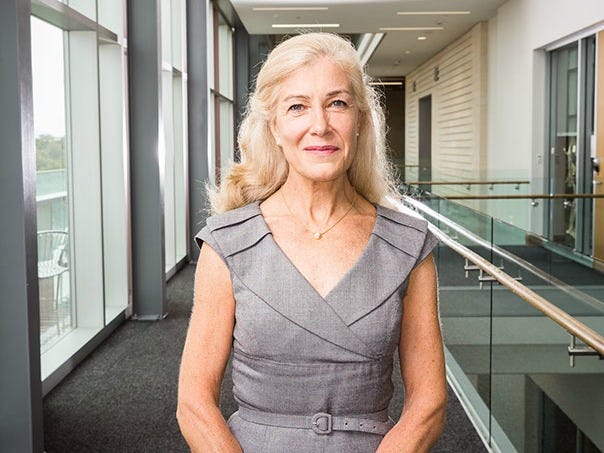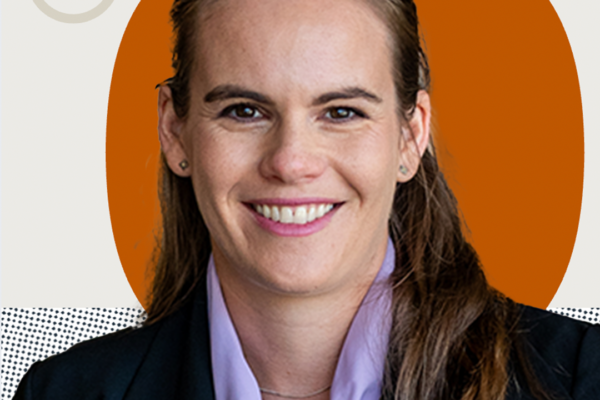The Strategist Behind Dell Medical School’s Value-Based Health Care Vision
Elizabeth Teisberg is focused on establishing a comprehensive new kind of health care system that costs less and delivers more.
By Molly Jordan Dannenmaier

Elizabeth Teisberg, who holds joint faculty appointments with Dell Medical School and the McCombs School of Business, started her job a year ago as executive director of the Value Institute for Health and Care at The University of Texas at Austin. Since that time, she has been focused on one goal: establishing a comprehensive new kind of health care system that costs less and delivers more.
Dell Medical School’s new teaching hospital, Dell Seton Medical Center at The University of Texas, opened May 21, and Teisberg’s principles of value-based health care are already informing both patient care and institutional reimbursement. It’s a vision she put forward 10 years ago when she wrote the book “Redefining Health Care: Creating Value-Based Competition on Results” with Harvard Business School Professor Michael Porter.
At the time, the debate in the country around health care was about whether to spend more or ration more, explains Teisberg. “The ideas we introduced created a third choice,” she says. “At first, some called it a utopian vision. Now it is the discussion.”
In a nutshell, the idea is to increase positive patient outcomes and decrease cost by restructuring delivery models and reimbursement incentives. Since writing the book, Teisberg has helped health care organizations across the globe figure out how to make this approach work. At UT, Teisberg has spoken before many audiences about how she’s seen value-based principles enable a whole new kind of patient-centered health care.
Now she’s seeing her ideas implemented on a larger scale than ever before, as an entire academic medical system embraces value-based care as its guiding principle from day one.

A Scholar of Strategy and Innovation
Previously, Teisberg was a professor at Dartmouth’s Geisel School of Medicine, Harvard Business School, and the University of Virginia’s Darden School of Business. She holds advanced degrees in engineering economic systems from Stanford and in systems science from the University of Virginia, and has spent her career working as a scholar of strategy and innovation.
She turned her professional attention to health care after trying to navigate the current system on behalf of her son, who suffered a painful illness for five years before finally being properly diagnosed. Teisberg believes that relief for her son could have happened within weeks if the health care delivery system had been structured differently.
“Not even the most informed, most activated consumer can change the dysfunctional structure of care delivery,” she later wrote in the Journal of Thoracic and Cardiovascular Surgery.
Guiding Principles
Teisberg investigated best practices worldwide and developed a set of principles that she has since honed over the past decade in her work with health care practitioners:
Clinical care should be organized around patient symptoms instead of physician specialty. A migraine sufferer, for example, may need the services of a neurologist, psychologist, physical therapist, and a few other specialists. When such multidisciplinary teams cluster together in “headache centers,” patients receive more effective treatment than when they have to navigate their own care among unconnected specialists, Teisberg has found. The same holds true for patients with diabetes combined with hypertension and neuropathy, children with congenital heart disease, and other patient groups who share common conditions. The first integrated clinical practice units in Austin are focusing on orthopedics and complex gynecological conditions. Dell Med faculty physicians are part of the interdisciplinary teams.
Measuring patient outcomes is critical. This is something that most health care systems do not do. Satisfaction surveys may assess how patients feel they are treated by practitioners, but in the value-based model, patient improvement and ability to function in daily life are what is measured.
Team practices can be established by documenting “care paths” implemented by an integrated team, and solutions should be designed using the direct experience of patients. In Austin, as they have done elsewhere, Teisberg and Dell Med Associate Professor Scott Wallace have instituted a “patient experience group” program in order to make sure that patients’ voices are incorporated into any assessment of treatment effectiveness.
New reimbursement models are a key part of the value-based approach. In the traditional fee-for-service model, providers are reimbursed whenever they see a patient, order a test, or perform a medical procedure — regardless of the result. In Teisberg’s model, different payment types are combined — salary, bundling, capitation, and fee for service — allowing clinical teams to personalize treatment plans to individual situations and to make decisions based on the most effective, appropriate, and efficient care for the people they serve.
Even with the current state of national health care coverage in flux, Teisberg and the Dell Med team are hoping that the groundwork they are laying now to develop new payment models — with partners such as Central Health, the Seton Healthcare Family, UT Austin, and CommUnityCare clinics — will stand as a national model.
In the meantime, Teisberg is not slowing down. In between talks across campus and the country, leading executive education courses, and working to establish value-based health care in Dell Med’s new clinical endeavors, she is working with McCombs to create a new health care management master’s degree. She’s also writing a forthcoming book: “Capability, Comfort, and Calm: Designing Health Care Services for Excellence and Empathy,” co-authored with Wallace, her co-director of the Value Institute for Health and Care at Dell Med.
Her enthusiasm for health care transformation is buoyed by the fact that she’s seen it happen many times over her 10 years of introducing its principles to practitioners across the world.
“Transformation to human-centered, value-based care can happen here because Austin is so open to innovation. It’s such a vibrant city,” says Teisberg. “My colleagues at Dell Med and McCombs are an awesome team for making this new vision a reality.”
Originally published at www.today.mccombs.utexas.edu.
About this Post
Share:


